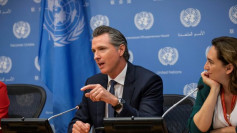A recent investigation into Havana Syndrome, the mysterious ailment affecting U.S. officials globally, suggests a connection to a secretive Russian intelligence unit deploying acoustic weapons.
"60 Minutes" host Scott Pelley and his production team recently explored the complex and ongoing investigation into Havana Syndrome. This perplexing condition has impacted U.S. national security officials, diplomats, and their families worldwide.
According to sources, the inquiry, now in its fifth year, has unearthed disturbing ties to a clandestine Russian intelligence operation purportedly involving the deployment of acoustic weapons.
Lt. Col. Greg Edgreen, identified as a key figure in the Pentagon's probe, suggested with considerable confidence that these incidents were orchestrated by Russia, aiming to debilitate U.S. personnel worldwide. A significant piece of evidence in the investigation was a "receipt" for acoustic weapons testing linked to a Russian intelligence outfit associated with Havana Syndrome cases.
“There was some angle where they had worked against Russia, focused on Russia, and done extremely well,” Greg explained. He also claimed that the official US bar for proving Russian involvement had been set too high because his country did not want to "face some very hard truths.”
Investigative journalist Christo Grozev played a crucial role in the investigation, leveraging his background in reporting on notable poisoning incidents to expose Unit 29155, a secretive Russian group allegedly specializing in covert operations utilizing technologies like acoustic energy weapons. Grozev's identification of a document connecting Unit 29155 to such weaponry marked a crucial advancement in the ongoing investigation.
The team also shed light on instances where affected U.S. officials experienced further assaults after returning stateside, describing encounters with strange sounds followed by a spectrum of severe symptoms ranging from memory loss to vestibular disorders.
Victims shared personal accounts of their experiences, detailing episodes of vertigo, disorientation, and nausea. For instance, Olivia Troye, a former adviser to Vice President Mike Pence, and Miles Taylor, former deputy chief of staff at the Department of Homeland Security, recounted their distressing encounters, with Taylor noting a suspicious incident involving a white van.
One victim of the syndrome, an FBI agent, told "60 Minutes" about being hit by a powerful force at her Florida home in 2021. "Bam, inside my right ear, it was like a dentist drilling on steroids. That feeling when it gets too close to your eardrum? It's like that, times 10,” it claimed.
Additionally, the investigation touched upon suspected Havana Syndrome episodes in Tbilisi, Georgia, linking them to Unit 29155 and further emphasizing the global reach of these attacks, the Business Insider reported.
The probe also delved into the potential use of microwave technology as a weapon, with physicist James Benford discussing the harmful effects of portable microwave transmitters capable of penetrating walls and damaging brain tissue.
Despite the extensive findings presented by "60 Minutes," the precise perpetrators behind Havana Syndrome remain elusive. Producers Oriana Zill de Granados and Michael Rey acknowledged the challenges in definitively identifying the attackers, citing conflicting intelligence assessments and the continuing mystery surrounding the syndrome's origins.
However, Dmitry Peskov, the Kremlin's spokesman, denied there was any evidence of Russian involvement and said the report's accusations were unfounded, BBC reported. "This topic has been talked up in the press for many years already. And from the very beginning most often it's linked to the Russian side. But nobody has ever published any convincing evidence, so all this is nothing more than a groundless and unfounded accusation," he said.
In response to the report, US officials told CBS News that they would "continue to closely examine anomalous health incidents." Still, they reiterated that it was "very unlikely that a foreign adversary is responsible."
However, they stated that they did not "call into question the very real experiences and symptoms that our colleagues and their family members have reported," and that their efforts to address such incidents were a priority.






